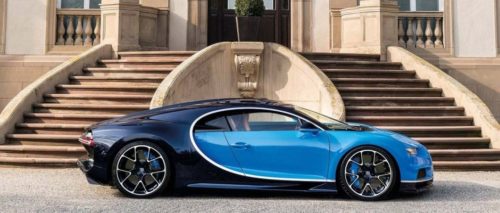Five Reasons Why Electric Supercars Are the Future

When most car enthusiasts think of a ‘supercar’ they picture a Porsche or Lamborghini or perhaps a Bugatti Chiron in royal blue. They think of carbon fibre shells and 0-60 mph in 2.3 seconds and even scantily-clad women draping themselves over the bonnet at car shows. They think of chrome and fins and vents and low-slung beauty.
And finally, they think of a hefty dollop of so-fast-it’s-ridiculous gas-guzzling magnificence beneath the bonnet, where a frightening eight miles to the gallon around the city is the norm but top speeds of 260 mph are easily attainable, as long as you can afford to keep putting petrol in the tank.
What they don’t think about are supercars running on electricity, because those muscular specifications – the speed, the acceleration – are just not possible in a battery-powered car, right?
Well they’re going to change their minds, and soon, because 2017 is the year electric supercars really have come of age. Just take the beautiful BMW i8 as an example:
It’s taken a while, and the progress has been painfully slow at times, but it would seem that the dominance of petrol-powered supercars is coming to an end. With Elon Musk’s Tesla leading the way, many of the established companies – such as Mercedes-Benz and Renault – have followed suit, and the pace appears to be quickening in terms of electric supercar development.
We reached out to leading Supercar Hire Company, SupercarsWestLondon.co.uk who commented:
“For the first time ever, we have had customers asking what electric supercars are coming in. The BMW i8 has been extremely popular, as has the Tesla with Ludacris mode enabled. We’re excited to see how this develops and will certainly be investing heavily in electric supercars.”
So with all signs pointing to electric supercars being the new beasts of the future, here are 5 reasons why the dominance of them is inevitable:
Environment
We are all becoming more environmentally aware, and more concerned with the damage we and our cars are doing to our planet. Electric cars offer a viable environmental alternative to the conventional internal combustion engine – they don’t consume oil or petrol, have no exhaust pipe spitting out harmful pollutants, and their greenhouse emissions are drastically smaller.
People are slowly turning towards alternative, greener options for many things in their lives, and supercars are one of them. Manufacturers have sensed the sea change, and are acting accordingly by rolling out electric muscle cars and even promising to halt producing petrol-powered vehicles completely.
Incentives
There are numerous state-run – on both a national and local level, depending on the country – incentive packages in place for electric car manufacturers and owners.
More than twenty European nations have such strategies, while North America, Australia and a handful of Asian countries have some kind of incentivised deals in place. These range from tax credits, subsidies for companies and purchasers, and even cash offers for people trading in an old petrol car who switch to electric.
The UK offers some of the best incentives. From grants of up to 35% of the purchase price to zero road tax and more.
Oil Prices
Geopolitical issues forced the price of a barrel of oil to ludicrous levels in the mid- to late-noughties, and some car owners fear it could happen again.
The world is an increasingly unstable place, after all. But with an electric car this is not an issue – there is no reliance on fossil fuels in terms of the actual car, as it is simply a case of plug in, charge, and go. No queuing at pumps, no concerns over being able to afford a tank of petrol.
Battery Life
Advances in battery technology, and their plummeting costs since 2001, have been at the heart of the resurgence in the popularity and efficiency of electric vehicles. Most new cars are powered by lithium-ion batteries or close variants, and the new breed of supercars come with some of the most advanced battery technology the world has seen, providing ranges of up to 600 kilometres before a recharge is needed. The conventional petrol-powered car simply can’t compete and battery power continues to get better.
Performance
The biggie. Earlier supercars or concept cars powered by electricity were no match for the massive turbocharged internal combustion engines found in conventional supercars. All that has changed. Singapore firm Vanda Electrics debuted its ‘Dendrobium’ hypercar this year. Just take a look!

Its specs are simply awesome: a top speed of 200 mph and 0-60 in 2.7 seconds means it is an electric vehicle that can compete or beat the best petrol supercars out there. And Tesla, ever the market leader, has produced the Model S – which outguns even the Porsche 911 Turbo S in terms of performance.




